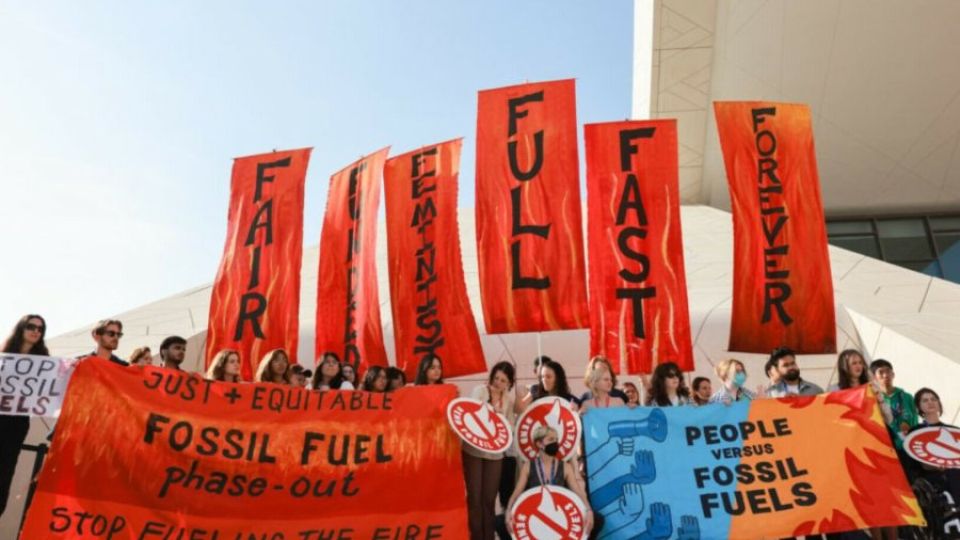December 19, 2023
ISLAMABAD – “We want justice … climate justice!”
The chants get louder. Slogans. Placards. Badges. Scarves. And a lot of young people. These scenes contributed greatly to the vibe of COP28 in Dubai.
Following the 2022 floods in Pakistan, which plunged a third of the country underwater and displaced eight million people, climate change has become an unavoidable reality for the country. Since then, youth climate activism in Pakistan has increased steadily, which was evident at COP28.
“Having attended many COPs, it is exhausting witnessing world leaders prioritise power over people,” said Rida Rashid, representing Fridays for Future and Re-Earth Initiative, among other climate action groups. Rida’s passion lies in accountability: “I focus on holding local, national, and international governments accountable by advocating for transparency and accountability mechanisms.”
The annual United Nations climate negotiation is notorious for overrunning and this year was no different: scheduled to wrap up on 12 December, the conference instead concluded with the publication of its final agreement (representing almost 200 parties) on the following morning. The resulting document is the first of its kind to explicitly agree upon “transitioning away from fossil fuels”.
But the cohort of young Pakistani climate activists that The Third Pole rubbed shoulders with were particularly interested in more local issues.
“My focus in this COP is the Loss and Damage Fund, and work being done around just transitions, as these two are very relevant to Pakistan,” said Hania Imran, who heads up Youth Climate Activists Pakistan. “Pakistan pushed hard at COP27, but we don’t know yet if the funds will be given to us in the form of loans. And we also don’t know whether the reparations will be handed over to the government only, or to communities as well.”
This time, through the COP In My City initiative, a cohort of eight young Pakistani climate activists came to COP28 with support from the country’s Ministry of Climate Change, which Hania described as “extraordinary”.
“It was an amazing experience to bring youth from different regions of Pakistan to an international platform like COP28. They got to learn first-hand how climate diplomacy works,” said Hafsa Rizwan, a project lead for COP in My City and a climate consultant.
Hafsa said involving youth in climate diplomacy and activism is imperative — especially in Pakistan, where 68 per cent of the population is under 30. “They are the ones who will take the climate conversation forward,” she says. “Secondly, while policies are made by the federal and provincial policymakers, implementation is on the ground. That is where the youth steps up. Therefore, their voices should be part of the policies.”
The Third Pole met Zainab Zahid, an activist representing YOUNGO, the official youth group of the UN Framework Convention on Climate Change (UNFCCC). She is also a member of the youth-led Climate Forward Pakistan (CFP). “Empowered women are important stakeholders for achieving equitable climate action. As society-shapers, women bear critical responsibilities, given their vulnerability to climate impacts, and central roles in agriculture and natural resource management.”
Meanwhile, CFP co-founder Durlabh Ashok advocated for the transformative potential of technological climate solutions: “By emphasising innovation and its potential to enhance climate resilience, I aim to spark conversations that propel the integration of cutting-edge technologies into sustainable practices.”
Durlabh was closely watching Global Stocktake developments at COP28, which included the conclusion of the first-ever Youth Stocktake of UNFCCC processes, which analyses youth engagement.
Kamran Ali, the co-founder and lead organiser of Fridays For Future Pakistan, travelled to COP28 from Ghizer, in Gilgit-Baltistan. “In places like Gilgit-Baltistan in Pakistan’s northern mountains, activists face tough challenges because of the difficult terrain,” Kamran explained. “It’s also tricky to share information or organise events because there’s not good internet or phone service.”
Kamran told The Third Pole that the region’s growing vulnerability to climate-induced hazards, such as recurring floods, motivated him to step into this field: “I feel a deep sense of responsibility to contribute to finding sustainable solutions and resilience-building strategies for regions like Gilgit-Baltistan. The urgency to prevent or minimise the impact of such disasters on communities pushed me to work towards creating awareness, implementing adaptation measures, and advocating for policies that prioritise climate resilience.”
Attending his third consecutive COP, Hafiz Jawad Sohail told The Third Pole that his focus this year was on gaining a better understanding of national climate policymaking, to appreciate how to incorporate representation for young people: “I have been trying to learn how international climate diplomacy works and negotiations happen at international stages like COPs.”
The Third Pole also spoke to Aisha Khan, the chief executive of the Civil Society Coalition for Climate Change (CSCCC). We asked if she had any advice for young people in the climate movement: “The youth can make a more meaningful and effective contribution if they acquaint themselves better with the articles of the Paris Agreement and look for avenues to align their activities in ways that help countries to achieve Nationally Determined Contributions (NDC) commitments.”


